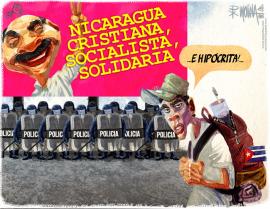
Nicaragua’s eight-month long political crisis is escalating. In the past two weeks, the government of Daniel Ortega has intensified its crackdown on opposition media and on NGOs while facing the US administration’s passage of the Magnitsky-Nica Act legislation.
The government rescinded the legal status of nine NGOs in one week, at once seizing their assets, freezing their bank accounts, and sending into exile and hiding a new cluster of oppositional leaders. The crackdown began with CISAS, a renowned health promotion NGO led by a vocal feminist opponent to the regime, then CENIDH, the national human rights organization, and then a host of other organizations – from environmental and community development NGOs to economic think tanks that the government itself has relied upon for data and analysis.
Attacks on the independent media have been ongoing, with radio stations pulled off the air, television hosts assaulted and arrested, and national and international journalists attacked, their wares confiscated. Last week Carlos Fernando Chamorro was in the crosshairs. Former editor of the 1980s FSLN party organ Barricada, and son of ex-president Violeta Barrios de Chamorro and journalist Pedro Joaquin Chamorro, whose assassination led to the downfall of dictator Somoza, Chamorro is one of Central America’s most respected journalists and Nicaragua’s most important independent media figure. In the wee hours of last Friday morning, the offices and newsroom of his web-based news service Confidencial and news programs Esta Noche and Esta Semana, were ransacked by Nicaraguan police; the following night it was occupied by them.
On Saturday morning, with a barrage of national and international media at his side, he approached the police to ask why and to remind them that his was not an NGO, but private property that they were violating. Nothing was forthcoming. Instead, dozens of police emerged from the gate of their precinct in riot gear, and pushed, shoved, kicked and forcibly removed the entire lot of journalists from the neighborhood, pursuing them for blocks. A week later, it was the Television station 100% Noticia that was targeted for censure. Yesterday (December 21), 100 anti-riot police stormed and raided the channel while it was on the air, arresting the vocal regime critic director Miguel Mora and declaring illegal the transmission of the channel by cable companies after 9:00 p.m.
With eight months of a national political crisis brought on by the state repression that followed student protests, the country is on the brink of collapse. At least 325 people have been killed, thousands injured, and 30,000 refuged and in exile in Costa Rica. According to the supreme council of the private sector COSEP, capital flight has reached $US1.3 billion, 300,000 jobs have been lost, GDP has decreased by 11% and the tourist industry is decimated.
Human Rights Groups Expelled
Human rights violations condemned globally by international agencies, governments, human rights organizations, and both Left- and Right-wing opposition movements and media, are continuing.The Inter-American Commission on Human Rights (IACHR) has characterized the repression in phases. Following phases of state repression, a terror campaign named ‘clean-up operation’, and widespread criminalization, this fourth wave of repression takes aim at journalists and NGOs. The IACHR itself is not immune, and also this week, two of its verification bodies documenting abuses – the Interdisciplinary Group of Independent Experts (GIEI in Spanish) and MESENI, the Special Follow-up Mechanism for Nicaragua – were expelled from the country amid condemnation from the OAS.
For the government, any sector that critiques it is part of an imperialist plot to overthrow it. Ironically, plotters include the Catholic church and the private sector – sectors that had been key supporters and collaborators with Ortega’s neoliberal populist leanings over the past eleven years.
But as a keen anonymous political observer in Nicaragua noted, “most of the NGOs, and definitely the media of Chamorro [and Mora] are special targets because, as has happened in other revolutionary movements over the years, there is a special kind of hate or circle of hell for apostates from the revo-credo. They hate what they see as ex-Sandinistas with a passion, probably because they actually do know where the bodies are buried, if one wants to put it in Godfather or Soprano terms. They hate them more than any Liberal or Conservative. Those, they can make a deal with. They cannot deal with the other side of their own mirror. It is an extension of the internecine conflict that goes on in leftist circles and cycles.”
Quick to capitalize on the moment, right-wing sectors in the US administration with an historic enmity for Nicaragua have successfully pushed President Trump to declare key figures in the Ortega regime – including his wife and Vice-President Rosario Murillo and her top security aide – personae non grata using the Magnitsky legislation. More damaging though, is its merger with the Nica Act first introduced in 2017. Passed into law this week, the combined legislation imposes both individual sanctions and the conditioning of loans to the Ortega regime by international financial institutions, such as the International Monetary Fund (IMF), the World Bank (WB), and the Inter-American Development Bank (IDB). The effects on public spending will be severe, hurting the poor the most.
Meanwhile, the largely exiled opposition demanded last Sunday that they be allowed to return during a caravan for justice and freedom that saw hundreds of refugees and exiles bus and walk to the border between Costa Rica and Nicaragua. The caravan was largely symbolic, as a return under present conditions is impossible. However, the more time away, the more consolidated the opposition’s proposed program for a transition to democracy grows.
Ortega and Murillo have made it clear they have no intention of giving up power, repression is deepening, and international pressure is mounting. Given the current morass, what a post-Ortega future might look like – and how it might come about – is yet to be seen.


Leave a Reply